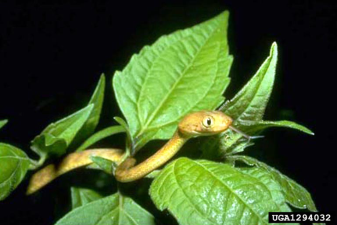



Photographer: Gordon Rodda Affiliation: U.S. Geological Survey Source: Bugwood.org Copyright: (CC BY-NC 3.0 US)
A slender, climbing snake with large eyes and vertical pupils, for improved nocturnal vision. The head is considerably wider than the neck. Markings may be either vague or distinct blotches on a brownish-yellow background. Black speckling may also be present on some individuals. Brown tree snakes are about 38 centimeters at hatching and may reach three meters long, but are usually one to two meters.
The brown tree snake has decimated Guam's birds and herpetofauna, causing the local extinction of over half of Guam's native bird and lizard species as well as two out of three native bat species. Several indigenous or endemic species of lizards in Guam have become extinct or engangered because of brown snake predation. Guam's 12 forest birds were especially impacted, with 10 species eliminated and the other two severely reduced . By eliminating native pollinators the brown tree snake has also caused "cascading" effects on Guam ecosystems, reducing pollination by lizards and birds and reducing native plant regeneration and coverage as a consequence.
Since Guam is a major transportation hub in the Pacific, numerous opportunities exist for the brown tree snakes on Guam to be introduced accidentally to other Pacific islands as passive stowaways in ship and air traffic from the island.
Shortly after World War II, and before 1952, the brown tree snake was accidentally transported from its native range in the South Pacific, probably as a stowaway in ship cargo.
South Pacific
U.S. Habitat: Agricultural areas, coastland, natural forests, planted forests, range/grasslands, riparian zones, scrub/shrublands, urban areas, wetlands
Distribution
U.S. Present: Commonly found in Guam. It has been reported in TX, HI, AK, and OK.
A variety of modified crawfish or minnow traps have been used on Guam to trap snakes. Trapping snakes with live-mouse lures is the principal control technique for this invasive species on Guam.
SEARCH Online
Google Search: Boiga irregularis
Google Images: Boiga irregularis
NatureServe Explorer: Boiga irregularis
Bugwood Network Images: Boiga irregularis
References
Fritts, T. H. and D. Leasman-Tanner. 2008. The Brown Treesnake on Guam. U.S. Geological Survey. Accessed 17 Nov. 2010: http://www.fort.usgs.gov/Resources/Education/BTS/.
McCoid, M. J., T. H. Fritts & E. W. Campbell, III. 1994. A Brown Tree Snake (Colubridae: Boiga irregularis) Sighting in Texas. Texas Journal of Science 46: 365-368.
National Biological Information Infrastructure (NBII) & IUCN/SSC Invasive Species Specialist Group (ISSG). 2009. Boiga irregularis. Global Invasive Species Database.
Rodda, G. H., Fritts, T. H., McCoid, M. J., & Campbell III, E. W. 1999. An Overview of the Biology of the Brown Treesnake (Boiga irregularis), a Costly Introduced Pest on Pacific Islands.
Rödder, D., & Lötters, S. 2010. Potential Distribution of the Alien Invasive Brown Tree Snake, Boiga irregularis (Reptilia: Colubridae) 1. Pacific Science, 64(1), 11-22.
Vice, D., and R. Engeman. 2000. "Brown Tree Snake Discoveries During Detector Dog Inspections Following Supertyphoon Paka." Micronesica. 33: 105-110.